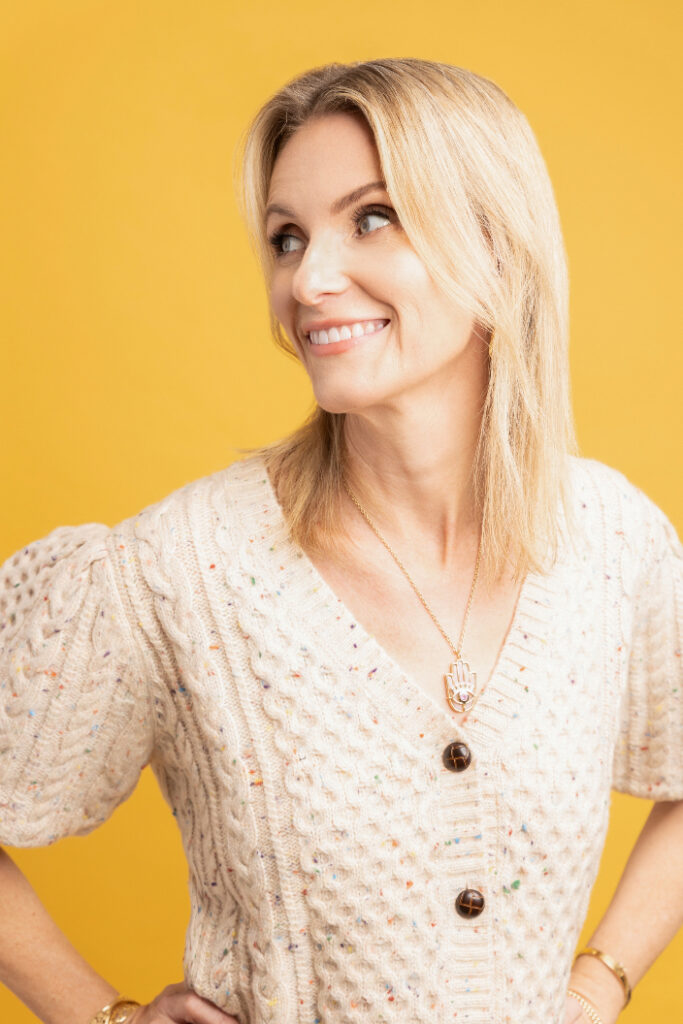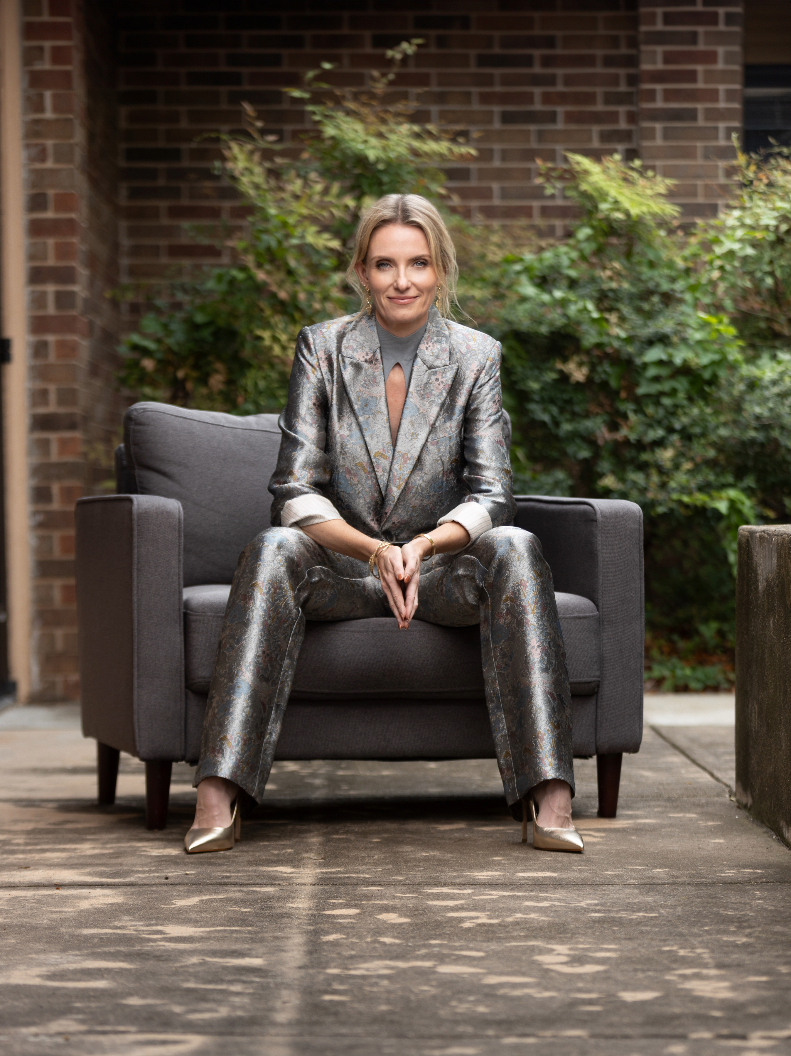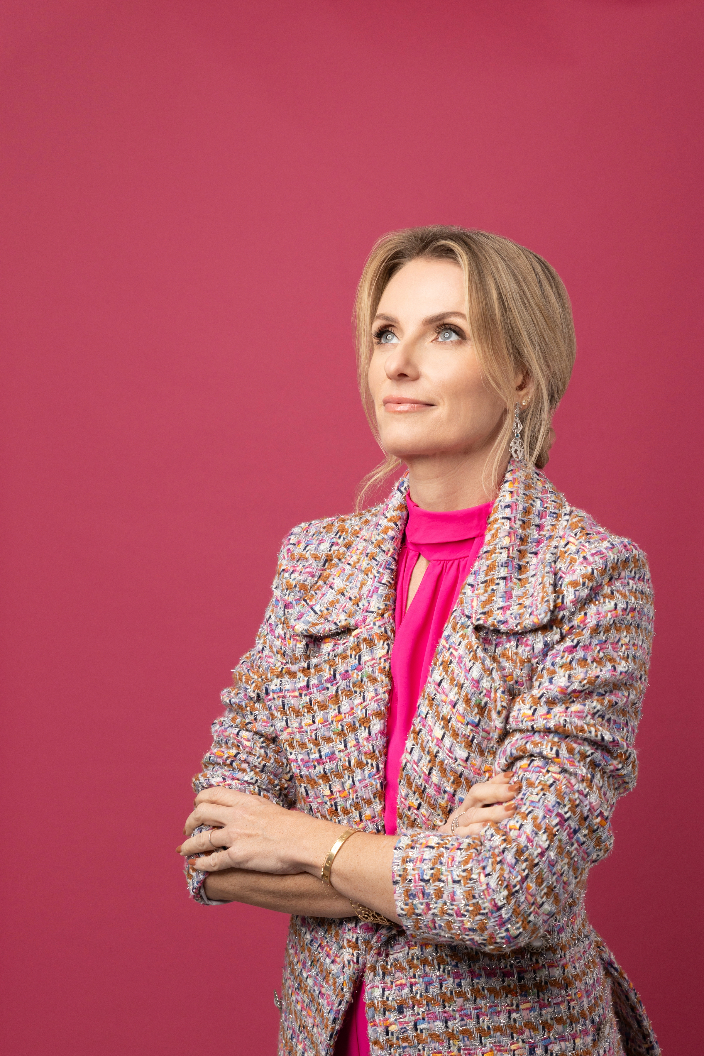New AffiniPay CEO Dru Armstrong gives her perspective on teams in life and work.

By Jenny Hoff, Photos by Korey Howell. Styling by Teresa Test, with inspiration from Estilo Woman. Jewelry by Jamie Turner Designs. Hair and makeup by Angelo Pegran. Shot on location at Korey Howell Studios. Special thanks to Michael Samaripa, Olympia Roll and Ana Longley.
Every successful restaurant starts with a visionary—an innovative chef who can create delightful and surprising dishes, something that’s different yet feels familiar, an experience and product diners will continue to crave. But a visionary chef is just one ingredient. Success also requires intense coordination, a team with a diverse skill set that shows up every day ready to give 100%, with a commitment to customer satisfaction and efficient service.
It’s a recipe for success that Dru Armstrong knows well. Before becoming CEO of fintech payment solution company AffiniPay, even before initially pursuing a career in law or business, Armstrong worked in New York City’s restaurant scene during her year as a culinary student.
“I grew up in a family that was very passionate about food, and I thought it would be a great opportunity to really learn how to cook,” recounts Armstrong, as she makes tea in the light-filled kitchen of the AffiniPay office, which takes up a large floor in a sleek office building in Westlake.
While she quickly realized cooking was more of a passion than the right career choice for her, she’s never forgotten the important business lessons she learned while watching how a successful restaurant operates. “There is something magical about how in a kitchen, everyone has to be on their A game and bring a high level of work, day in and day out.” For everything to function, communication was key, and it had to start at the top.
“One of the ways Dru is different from other CEOs is her communication,” explains Christian Fadel, AffiniPay’s CFO, who says that in his 25 years of working in private equity, Armstrong is the first female CEO he’s gotten to work with. “Dru is a heavy communicator. She’s an external-thinking CEO, and it keeps us aligned.”

After culinary school, Armstrong went on to law school at the University of Chicago. Having grown up with an attorney father whom she adored, she thought she would follow in his footsteps. But like culinary school, she realized that law wasn’t her path. “I’ve never been a person to stay in a job or a career that didn’t feel like a good fit,” she says. “At every internship, at every job, you need to ask yourself if that culture is for you, if it excites you.” While she stayed committed to finishing law school, she also decided to pursue a master’s degree in business, where she could use her analytical skills, problem-solving abilities and her creativity to help a business flourish.
Armstrong started her business career with Boston Consulting Group and was later recruited to the executive level at a private equity firm. She even got involved in founding a startup. She was successful and in demand. But behind the scenes, she was also trying to keep her loved ones afloat.
“I left private equity to join this baby monitor startup,” Armstrong says. “Within a month of leaving my paying job to join this startup, I found out I was pregnant. A few months later, my husband had some serious health issues where we thought he would lose his eyesight. I got to experience fundraising while pregnant and balancing family health issues.”
With a baby on the way and money tight, Armstrong remembers that time with gratitude. Being close to Stanford with its top-notch medical team, they were able to save her husband’s eyesight. He got his vision back a week before their baby was born.
“During that time, she was basically on her own,” recalls her husband, Scott Armstrong, who works in the tech industry. “I’ve had a lot of health issues, and she always steps up and comes through. She’s rock solid when stuff like that happens.”
Building a Diverse Workforce
After this experience, Dru decided to return to a job with a paycheck and joined Grace Hill, a real estate technology firm that services property management companies. Though she had no experience with property management, she knew how to solve problems. Six months in, she was promoted to the top job and ended up running Grace Hill as its CEO for the next five years.
While she knew she could solve problems with companies from her experience at Boston Consulting Group, she was a newbie at learning how to build a team and a culture. So, when Grace Hill acquired a business run by Kendall Pretzer, who had built a property management company with a strong culture of female employees, Dru was eager to learn how to create that kind of tight-knit culture within her team. After all, she had witnessed the importance of building a top-performing support staff during her experience in the New York restaurant world.
“The reality of building a business is you need to have the right plan and the right focus,” she says. “But so much of it happens around the team and how you build a team, what culture you set, the vibes in the office and how you celebrate success.”


Long before remote work became the norm, Pretzer had discovered that using technology to allow flexibility was the key to recruiting highly qualified female workers who valued, above all else, the ability to make their own hours. She had witnessed many women leave corporate America once they had families, and knew she could create a win-win situation by tapping into that market.
“I didn’t want to lay in bed at night worrying about payroll,” says Pretzer, who is now CEO of Grace Hill. “So, I created contract positions where my employees ate what they killed. We built a strong culture around transparency and communication.”
Pretzer says the ability to share the “why” for a business’ mission is foundational to building culture. She’s seen Dru grow as a leader from not only being an innovator but in assembling a team that understands the vision and the purpose. When Dru was CEO of Grace Hill, she moved Pretzer into the role of COO. They not only became close friends, but Pretzer also became a mentor to Dru, who was about 10 years younger.
“She is an excellent visionary,” says Pretzer. “She can see two different products and see how they could work together. Where I could work with her was being able to take that vision and explain it in a way that our people could understand it and find a solution.”
Losing a Role Model
A vision is often driven by a mission. While the opportunity to lead AffiniPay was a great move for Dru’s career, the problem AffiniPay solves is also personally motivating for her.
Dru grew up very close to her father and, as mentioned, had even wanted to follow in his footsteps as a lawyer. But while she witnessed some great successes for him as an attorney, she also saw what happened to him financially when he opened his own private practice.
“He was a great lawyer, but not a good businessman,” says Dru. “Toward the end of his life, he almost went into bankruptcy. It’s really painful when the person who was your role model growing up goes from super successful to feeling like a failure. In my early days of working, I was providing financial support to my parents. That really shaped me.”
AffiniPay’s core product is offering payroll and software solutions to people like Dru’s father—private practice attorneys, associations and nonprofit organizations who need help with the administrative arm of their business.
According to Dru, a private practice attorney spends a third of their time on administrative work and writes off 25% of what they invoice. “So, there is about 50% leakage. You’re only getting paid for about half the time you put into it,” she says. “The core of AffiniPay is that we provide all the software and financial services solutions for a lawyer to run their office.”

Providing software that it owns is a relatively new product offering for AffiniPay. While the company had historically partnered with software companies for bundle product offerings, with competition in payments space heating up and software partners becoming competitors, Dru had the task as a new CEO in 2021 of convincing a split board to own the software outright.
“She came in and let data drive that decision,” recalls Fadel. “She did a lot of market research, educated the board on that research, and then we did the biggest acquisition we had done. We acquired MyCase, which took us from 250 employees to 500.”
Of those 500 employees, about 40% are women, which is much higher than the fintech industry average. Women also hold 4 out of 9 executive positions, with Dru at the helm. The female founder, Amy Porter, sits on the board.
“Diversity of thought allows you to be more innovative and understanding of where customers are coming from,” says Dru. “You can’t get diversity if you don’t have a strong foundation for how you attract, retain and promote your team.”
The office space is brightly decorated and festive, filled with a positive energy and work culture. An artist is hired to create pop art portraits of each employee after they hit three years. (Dru still has a year to go before her visage makes the wall.) Dru believes that the company, which currently brings in more than $200 million in revenue, will reach the billion-dollar mark in the not-too-distant future.
But the road hasn’t always been easy. While she has been lucky to have many mentors and career advocates along her journey, Dru lost her biggest supporter when her father passed away from a heart attack while she was still young in her career and just starting a family.
“When my dad died, it was very much like losing an anchor,” she says. “He would call me every day and at least leave a voicemail saying, ‘You’re the best.’ I had seven voicemails still saved on my phone the day he died. My son was only 7 months old.”
Dru would describe the last seven years as an endurance challenge, with a lot of sacrifice and commitment along the way. Losing her father, raising children, moving cities, trying to establish roots in Austin while running a rapidly growing company has forced her to look inward and work on her own health and well-being while also trying to be everything to everybody.
“When I was in my 20s and 30s, I thought that taking care of myself was just hitting it harder—getting up earlier and working later,” she says. “Now in my 40s, it’s more about health. I try to workout; I do acupuncture; I am conscious of food. The reality is when I’m having a bad day, it can make 500 other people have a bad day. I think how you show up to work is important.”
Her husband admits it’s a bit of a balancing act. Work for a CEO doesn’t end when you sit down for dinner. They have two young boys who are 6 and 9, playing sports like tennis and baseball. But through a strong partnership, they’re able to make it happen.
“It’s always been a give-and-take,” says Scott. “She stepped in when I had work and travel and vice versa. We’ve moved a lot; we’re like a traveling circus. In Austin, we have finally found a place we can put down some roots for the kids.”
When asked if she ever feels “mom guilt” for putting in 60- to 70-hour workweeks, Dru admits she doesn’t. She is working hard for her family and for her company and says there is nothing more feminist than showing her two boys that she can have a successful career while giving them a stable and loving home.
“I think the thing is that as a working mom, it takes a village. Sometimes you have to pay part of that village, and that’s okay,” says Dru. “There were times that I felt like my whole paycheck was going into childcare, but I always felt like it’s good for them to be exposed to a lot of people who really care about them, and not feel like that love and attention is only going to come from us.”
Looking Forward
AffiniPay has made the Fortune Inc. 5000 list 12 years in a row. With its acquisition of MyCase and the launch of its latest technology, LawPay Pro, it has a distinct edge in its market, due, in no small part, to Dru Armstrong, who has spearheaded the next chapter of the almost 18-year-old company. It not only serves legal businesses, but accounting, architectural, engineering and construction firms as well.
“With these solutions, you collect 30 to 40% more [money]than you would otherwise,” says Dru. “We have an amazing customer satisfaction rating for answering the calls, and we will fight chargebacks. We know your time is valuable.”

Dru also looks forward to staying put in Austin, having found a home with woods in the backyard where her boys can explore, and developing relationships with neighbors and new friends. Just coming up for air after a tumultuous span of having babies, moving cities, moving jobs and dealing with health issues, she’s excited to explore her foodie side, enjoying Austin’s ever-evolving restaurant scene.
Pretzer says while Dru is ambitious and focused, she’s also a fantastic dinner partner.
“My ringtone for her is ‘She Works Hard for Her (sic) Money,’” laughs Pretzer. “But she is also so much fun to eat with. When I first met her, we ate together at restaurants, and she would order all this food to taste and sample. She taught me that at every good restaurant there is an expert in wine, so she’ll call them over and talk about what she likes and doesn’t. She has a very discerning palate.”
Besides the great foodie scene with her favorite restaurants like Este and Jeffrey’s and cozy date spots like Neighborhood Vintner, Dru says Austin’s role in innovation was a huge draw for herself and her husband. Having lived in Silicon Valley during big tech, she is excited to be playing a more central role in the booming Austin business market.
“Austin feels like this perfect middle ground: everything you love about Texas and the South and yet all of the innovation and excitement and culture as it goes through another sea change,” she says. “Being more senior in my career, I felt as though I couldn’t just be riding the wave, but I wanted to be a leader in that change.”
In her early 40s with almost 20 years in a successful career, Dru Armstrong has learned some fundamental lessons about life and work: Prioritize physical and mental wellness; only work in environments that foster and support your growth; when choosing a life partner, choose well; and build the best work team you possibly can.
“It’s like being a chef: Every day you need to show up and deliver. At the end of the day, how did you execute these dishes? You need the vision at the top, but it’s about the team working together. It feels very similar; we just make software instead of food.”


